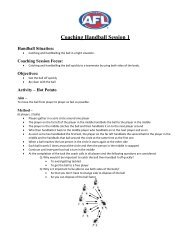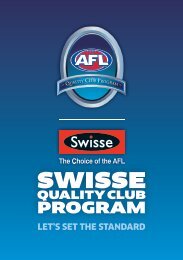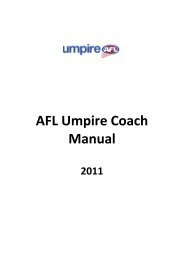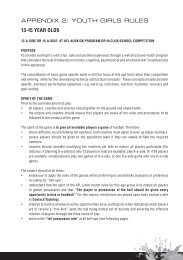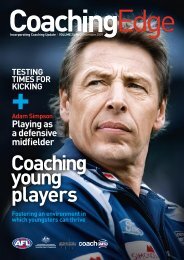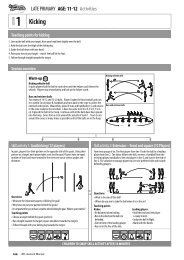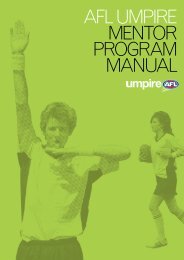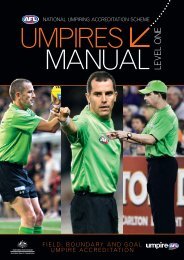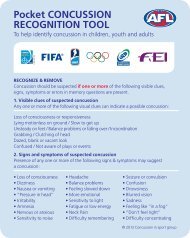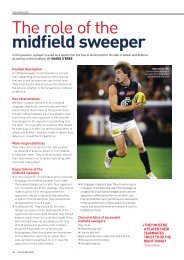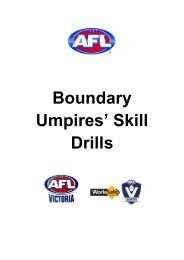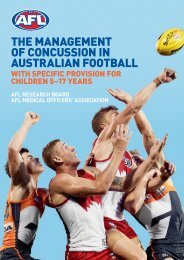2012 Youth Coaching Manual - AFL Community
2012 Youth Coaching Manual - AFL Community
2012 Youth Coaching Manual - AFL Community
Create successful ePaper yourself
Turn your PDF publications into a flip-book with our unique Google optimized e-Paper software.
Mental discipline<br />
Discipline can be applied to players’ thoughts and emotions, as well as their on and off-field behaviour. Teach your players<br />
to review their goals, discover their optimum level of arousal, control their self-talk, replace negative thoughts with positive<br />
ones and deal with their emotions.<br />
Unfortunately, many players don’t learn how to be disciplined until they experience real failure, disappointment, adversity<br />
or injury, forcing them to improve their discipline. However, through education and a commitment to enhancing player<br />
discipline, you may be able to help your players learn this valuable lesson sooner rather than later.<br />
Recommended coaching behaviours when working<br />
with youth players<br />
• Establish and consistently apply participation rules and regulations for players.<br />
• Work with each player to determine their personal goals.<br />
• Be enthusiastic and show enjoyment for the task of coaching.<br />
• Promote the value of each player and the role that they have in the team.<br />
• Encourage players to evaluate their own performance and discuss their evaluation openly.<br />
• Show concern for the physical and mental well-being of each player.<br />
• Learn to identify player anxiety and help the player cope.<br />
• Be an appropriate role model for players to follow.<br />
• Always publicly support players and the system, including officials and administrators.<br />
• Emphasise effort and enjoyment as well as winning. Do not emphasise winning to the exclusion of effort and<br />
enjoyment.<br />
• Ensure that all players have an equal opportunity to participate.<br />
• Maintain some distance with players while encouraging a calm, congenial atmosphere.<br />
• Learn to identify and understand the physical changes that can occur during early adolescence. Help players to adjust<br />
their sporting involvement to allow for these changes.<br />
• Use reward systems to maintain discipline and only occasionally use predetermined and high-impact disciplinary<br />
strategies.<br />
• Promote and insist on fair play and good sportsmanship.<br />
• Use each player at various times to take responsibility not only for the conduct of training and competition but also<br />
the conduct of the club.<br />
• Assign individuals to coaching and management roles with younger teams and/or players.<br />
• Allow players to take risks and explore the options in their sport.<br />
• Assess players according to their commitment and ability, not their personality.<br />
• Have a thorough knowledge of the rules, techniques and tactics of football.<br />
• Focus on all aspects of individual growth – developing physical and social skills and promoting attitudes such as fair<br />
play, sportsmanship, consideration for others, work ethic, striving for success, overcoming adversity and having fun.<br />
If included in a coach’s coaching repertoire, these approaches will enable them to help adolescent players satisfy their<br />
social and psychological needs through football more effectively. In particular, coaches should strive to:<br />
• Nurture the self-esteem of young adolescents.<br />
• Raise their sense of responsibility.<br />
• Confirm the worth of consistent and enduring relationships.<br />
• Promote sportsmanship, fair play and an honest effort.<br />
• Create a convivial and supportive environment.<br />
38 <strong>AFL</strong> <strong>Youth</strong> <strong>Coaching</strong> <strong>Manual</strong>



